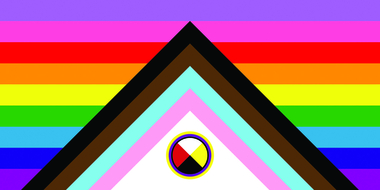The failure of words

- by Brian Eckberg
Two-Spirit Columnist
Two-Spirit Nation
Two-Spirit, IndigiQueer, Gay Indians; words are definitive labels. And for a group of people who frequently defy labels, they often fail to encapsulate us. Queer communities have frequently adopted terms to explain identity. And just as often, those terms become outdated.
When the first IndigiQueer organization was formed in San Francisco in 1975, they adopted the name Gay American Indians (GAI). In 1990, at the 3rd annual Inter-tribal Native American, First Nations, Gay & Lesbian American Conference near Winnipeg, the term “Two-Spirit” was adopted in an effort to find a more encompassing label.
However, even this one isn’t agreed upon by all queer Natives. Two-Spirit is a spiritual term that recalls the ancient and sacred space that queer people held in Native societies before the colonization of the Americas. But it also denotes the dual nature of a male spirit and a female spirit within a single person. And not everyone accepts that identity.
Queer people live within and without societies. The ambiguity of sexuality will always make our labels insufficient. It’s important to accept what people tell you about themselves. Societies love labels to help construct language and understanding. However, sexuality and gender are often ambiguous. The key is to listen to each other and grow comfortable with a lack of conformity.
The Diné (Navajo) people used the ancient term “nádleeh,” meaning “one who changes” or “one who is transformed.” The Ojibwe terms were “ininiikaazo/ikwekaazo,” meaning “woman/man who endeavors to be like a man/woman.” A Blackfoot term was “ninauh-oskitsi-pahpyaki,” meaning “manly-hearted woman.” Each of these words shows an understanding and acceptance of queer members within pre-Columbian tribes. However, each of these words could also be highly problematic or offensive in today’s world.
And that’s the point: words fail. A time will come when Two-Spirit becomes outdated or insufficient as a label. More accurately, the following labels to come will also be the same. No one word can encapsulate the experience of fluidity. Words are solid. They will never suffice. They’re always just a bit beyond what we try to define.
This explanation gives us all an opportunity to accept each other better. When a trans person tells you who they are, believe them. When a pansexual person tells you who they are, believe them. People know their nature, even when words cannot easily pronounce it. What we need is more trust and fewer labels.
We often make the mistake of needing definitions to understand people. Ambiguity can often feel like not being understood. But we can make our peace with ambiguity. Accept people with a label, between labels, or without one.
This column, which I write as a Two-Spirit person, is simply my own chosen label. I can speak for no one else’s experience. I try to highlight other Native people and their experiences of being queer in their own words, but every experience is unique, and every identity is their own. And that should be enough for us to accept one another.
Thanks for reading. Wado!
Brian Eckberg (English name)
Wayani (Cherokee name)
ᏩᏯᏂ (Cherokee syllabary)
He/They
All Nations Two-Spirit Society
The Gayly. 08/16/2025 @ 4:12 p.m. CST.





